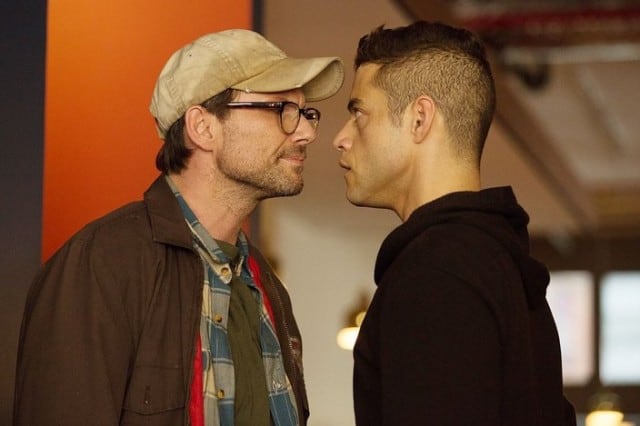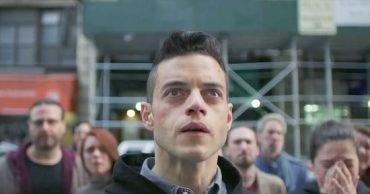
“The world is a dangerous place, Elliott, not because of those who do evil, but because of those who look on and do nothing.” – Mr. Robot, “eps1.1_ones-and-zer0es.mpeg”
Holy cow.
Back at the end of May, USA Network decided to try something interesting by releasing the pilot episode to their new summer series, Mr. Robot, online a month before its television premiere. For a series that wasn’t at all well-known, reception of the first episode was so strong from critics and audiences alike that Mr. Robot was renewed for a second season before it ever aired on television. Praise for the series continued throughout the first season, and it was hard to get on any form of social media without seeing someone talking about how great Mr. Robot was. Somehow, though, I managed to avoid all of this hype and never paid any attention to this USA show that had begun to take the country by storm. After the final episode of the season aired this week, however, I finally decided to take the plunge and see what this hype was all about.
Holy. Cow.
Even after only watching a single episode, it was hard for me to imagine that USA knew what they had on their hands when they first greenlit the series. The network has had hits, definitely, such as shows like Monk or Psych, but Mr. Robot is a completely different beast altogether. The show’s creator, Sam Esmail, even initially viewed this story as a feature film.
Visually, psychologically, narratively, what-have-you, Mr. Robot seems like it would have been much more suited on an HBO or a Showtime than where it actually aired. That’s not as close to a strike against USA as it sounds — rather, it’s a commendation of the superior quality that this near-perfect show has to almost anything else around.
Truly, Mr. Robot is a show like no other. Certainly, the show’s premise manages to stand out in the crowded television landscape in which we reside:
Mr. Robot follows Elliot (Rami Malek, The Pacific), a young programmer who works as a cyber-security engineer by day and as a vigilante hacker by night. Elliot finds himself at a crossroads when the mysterious leader (Christian Slater, The Adderall Diaries) of an underground hacker group recruits him to destroy the firm he is paid to protect. Compelled by his personal beliefs, Elliot struggles to resist the chance to take down the multinational CEOs he believes are running (and ruining) the world. The series also stars Portia Doubleday (Her), Carly Chaikin (Suburgatory) and Martin Wallström (Simple Simon).
Reading the basic story of the show, it’s easy to see how an unassuming audience could be gripped, but it’s only upon actually viewing the show that you’re truly able to understand what’s encapsulated the world. Echoing a trait of Dexter‘s antihero, Elliot, our protagonist, narrates the series in a first-person voice that instantly bonds you to our main character. Unlike on Dexter, though, Elliot proves to be an extremely unreliable narrator more and more as the series goes on. Truly, the events that we’ve seen throughout the first episodes of the season implode completely after a major twist near the end, and it leaves the audience wondering just how much of what we’ve seen happened the way that we think it did. The story begins in a complex way (after an extremely strong opening scene that almost entirely establishes the character of Elliot), and the narrative only becomes more complicated as it goes on. The sheer quality of the writing on Mr. Robot is utterly incredible with such an intricately crafted mystery, and the cast of the show absolutely shines with the material that they are given to work with.
Speaking of the cast, it blows my mind with just how solid this group turned out to be. Rami Malek, of course, does a wonderful job with the audience’s “glasses” as our narrator and main character, but the rest of the cast proves to be just as strong. Christian Slater brings the presence for which he is known as the titular Mr. Robot, the leader of the “fsociety” group of hackers, and it’s easy to see just how much he manages to bring to a role that could have been almost parody with any other actor. Rounding out the main cast are Portia Doubleday as Elliot’s childhood friend, Angela; Carly Chaikin as one of Elliot’s fellow fsociety hackers, Darlene; and Martin Wallström as Senior Vice President of E Corp, Tyrell Wellick. Each actor completely dominates the role that they are given, but the recurring cast of Mr. Robot is just as strong, even with less screentime than their peers. In particular, Frankie Shaw’s Shayla, Gloria Reuben’s Krista, and BD Wong’s mysterious character (who I will leave unnamed in this review in order to preserve more of the story’s masterful twists and turns) leave a trace of themselves whenever they appear on-screen, and each brings the level of the show up even higher.
Visually, every single aspect of Mr. Robot is on-point. The cinematography in each episode is comparable to what you would find in a big-budget film during Oscar season, and the direction is nothing less than remarkable. It seems as if every part of of the production of this show somehow managed to come together in the exact right place at the exact right time. While much of the color palette is muted and dull, fitting with the psychological profile of the main character, this palette does change when necessary, even in subtle ways, to fit each and every scene. In our “big business” offices, muted whites and grays are strengthened by the classically bright “technology blue” (think Intel), and our darker yellows, reds, and browns purvey the seedy underbelly of our city where Elliot spends much of his time.
It’s true that the complexity of the psychology of our characters is one of the most important aspects of Mr. Robot, and, also, one of the most difficult to get right. However, Mr. Robot expresses this deep level of characterization admirably. Aside from Elliot, whose unreliable narration serves to teach us more about him than any phenomenal silent description ever could, the characterization of Tyrell Wellick is one of the most interesting that I’ve seen in quite some time. Wellick could easily fit in the world of House of Cards, and it’s almost as if the creators of Mr. Robot took all that was great about the characters form the Netflix series and blended them into one of the most intriguing villains on television this season. That said, Wellick is entirely his own character that has no equal, for better or worse, anywhere else in the media landscape. Any given character on Mr. Robot could easily be the lead character of his or her own spin-off show chronicling their backstory and motivations, and it’s a testament to the quality of writing and acting that I would love to know everything about everyone. The ending of the season was very satisfying, but I am so excited about seeing the future of the show from here on out. Specifically, I can’t wait to see where BD Wong’s mysterious character goes from here, and I wouldn’t at all be surprised if this character is brought up to a series regular next season.
While it wasn’t a major aspect of the show, at least on the surface, Mr. Robot really did a great job at using music appropriately. The original score definitely fit the techno/cyberpunk thriller world that was built very well, but the show also did an incredible job at using music from outside sources to perfectly fit the scenarios and situations in which they were presented. A lot of times in my reviews, I mention how much a strong sense of music can help out a lesser show, but Mr. Robot is an example of how it can make an incredibly strong show even stronger.
It’s hard to pinpoint exactly why everything works about Mr. Robot, but it may be just that — everything works. A combination of the best aspects of the best shows on modern television, Mr. Robot manages to become its own unique creature that you can’t find anywhere else. As I mentioned earlier, it’s so odd to see that this show is an original to the USA Network, but this single 10-episode season has the potential to bring USA up to the level of premium cable networks. Mr. Robot could stand alongside shows such as Game of Thrones, True Detective, Hannibal, and Fargo insofar as sheer quality and power, and it’s sure to receive the nominations that it deserves when awards season rolls around.
I was waiting until the show was over to dive in, and, now, I realize that that was way too long. If there’s one thing that I want this season review to accomplish, it’s that you should definitely check out Mr. Robot. Jump in now, so that you can say you were with the show from nearly the beginning. One day, Mr. Robot will have an entry in the television history books showing what can be accomplished when every element of a production works together and builds off of each other. I never thought that I could say it (and mean it) about any television show (and I wouldn’t even say that Mr. Robot is one of my all-time favorites), but I truly feel that the first season of Mr. Robot is absolutely perfect and without fault. Check this one out. You’ll thank me later.
What did you think about the first season of Mr. Robot? Did you tune in from the beginning, or were you late like me? What do you want to see when the show returns in season 2? Let us know your thoughts and favorite parts about Mr. Robot in the comments down below!
[Photo via USA Network]
 Follow Us
Follow Us



